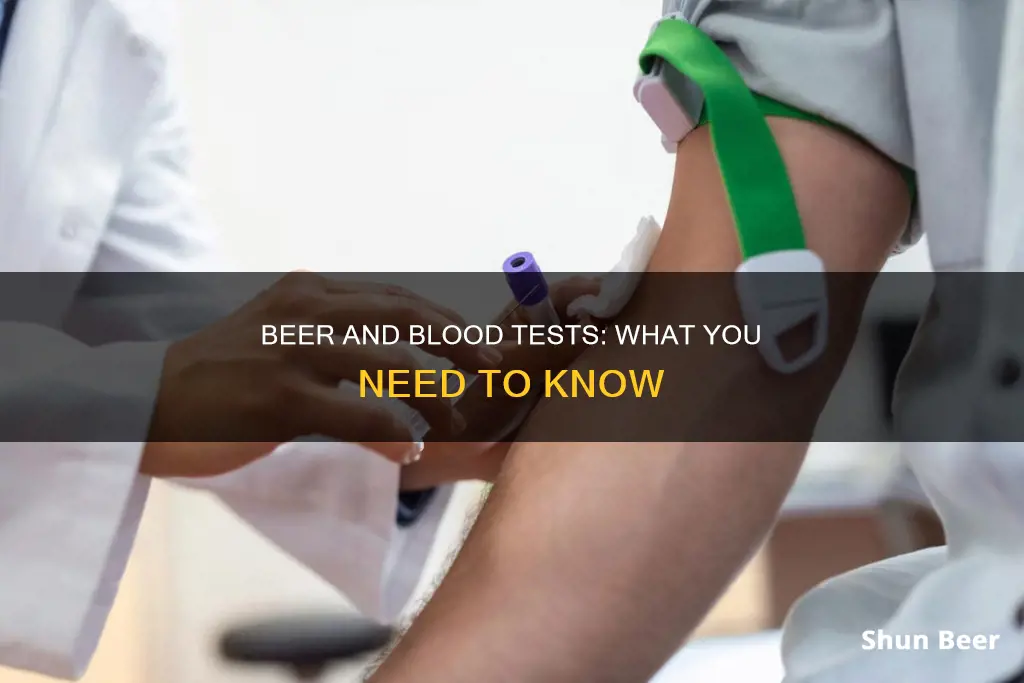
If you're scheduled for a blood test, you might be wondering if it's okay to have a drink the day before. The answer depends on the specific test and the amount of alcohol consumed. Alcohol can affect the accuracy of certain blood tests by altering enzyme and fat metabolism in the liver, glucose levels, and the pH balance of the blood. As a general rule, it is recommended to abstain from alcohol for at least 24 hours before a blood test to ensure accurate results. However, if you've consumed a small amount of alcohol within this timeframe, it's best to consult your healthcare provider for guidance.
What You'll Learn
- Blood tests can detect alcohol up to 12 hours after consumption
- Alcohol can remain in the body for several days
- Doctors recommend fasting for at least 8-12 hours before a blood test
- Alcohol can cause inaccurate results by altering the pH balance of the blood
- Heavy drinkers should be honest with their healthcare provider about their alcohol consumption

Blood tests can detect alcohol up to 12 hours after consumption
If you have a blood test coming up, it's important to know that alcohol can affect the accuracy of the results. Alcohol can stay in your bloodstream for up to 12 hours, and even tiny amounts can be traced in the blood several days after consumption. This is important to keep in mind if you're due to have a blood test, as alcohol can interfere with certain tests by affecting the levels of substances in your blood.
For example, alcohol can impact glucose levels in the blood, which can affect the results of a blood sugar test. It can also alter the levels of certain enzymes in the liver, which can impact the results of liver function tests. Additionally, alcohol can affect the clotting ability of the blood, which can impact the results of a coagulation test, and it can alter the pH balance of the blood, which can affect the results of an electrolyte test.
The amount of time alcohol stays in your system can vary depending on the amount consumed. Generally, the more drinks you have, the longer it will take for the alcohol to leave your system. It's recommended to avoid alcohol for at least 24 hours before a blood test to ensure the most accurate results. However, if you've consumed a small amount of alcohol within this timeframe, it's best to discuss this with your healthcare provider, who can advise you based on the specific test and the amount you've drunk.
If you're a heavy drinker, it's crucial to be honest with your healthcare provider about your alcohol consumption. They may recommend that you abstain from alcohol for a certain period before the blood test to ensure accurate results. Heavy alcohol consumption can also lead to serious health problems, including liver damage and an increased risk of certain cancers, so it's important to seek help and support to reduce your intake if you're a heavy drinker.
Beer and Meloxicam: Safe or Not?
You may want to see also

Alcohol can remain in the body for several days
The length of time alcohol stays in the system depends on the number of drinks consumed. Generally, it takes up to 12 hours for alcohol to leave the bloodstream. However, even tiny amounts can be traced in the bloodstream after several days of consumption. The blood alcohol concentration (BAC) typically starts dropping at a rate of 0.015 per hour, meaning alcohol will be metabolised and eliminated at a steady rate.
To ensure accurate blood test results, it is recommended to abstain from alcohol consumption for at least 24 hours before the test. This is especially important for fasting blood tests, such as a fasting blood glucose test or a liver function test, where patients are instructed to refrain from consuming anything except water for a set period before the test.
Blood tests are a reliable method for detecting heavy alcohol consumption and can effectively measure blood alcohol content (BAC). They can reveal the extent of a person's alcohol intake and help identify liver disease, excessive alcohol use, and changes in alcohol consumption during recovery.
If you have consumed a small amount of alcohol within the past 24 hours before a blood test, it is advisable to discuss this with your healthcare provider. They can provide guidance based on the specific test and the amount of alcohol consumed.
Beer and Gallstones: What You Need to Know
You may want to see also

Doctors recommend fasting for at least 8-12 hours before a blood test
Doctors recommend that you fast for at least 8-12 hours before a blood test. This means that you should not eat or drink anything except water during this period. Fasting is important because food and drinks can affect your blood test results. The vitamins, minerals, fats, carbohydrates, and proteins in food and beverages can alter your blood-level readings, leading to inaccurate test results.
Alcohol, in particular, can interfere with the accuracy of specific blood tests by affecting the levels of certain substances in the blood. For example, alcohol can impact glucose levels, enzyme levels in the liver, the clotting ability of the blood, and the pH balance of the blood. These alterations can affect the results of blood sugar tests, liver function tests, coagulation tests, and electrolyte tests, respectively.
Therefore, it is generally recommended to abstain from alcohol for at least 24 hours before a blood test to ensure the most accurate results. However, the specific test requirements may vary, so it is always best to consult with your healthcare provider for personalized guidance. They may advise you to refrain from alcohol for a longer period, especially if you are a heavy drinker or if the test is assessing liver health or triglyceride levels.
In addition to abstaining from food and alcohol, there are other things you should avoid while fasting for a blood test. These include chewing gum, smoking, exercising, and taking certain medications and supplements. It is also important to stay hydrated by drinking plenty of water, as this can make it easier for the healthcare professional to find a vein for the blood draw.
Beer and Antibiotics: A Safe Mix?
You may want to see also

Alcohol can cause inaccurate results by altering the pH balance of the blood
Alcohol can impact the accuracy of specific blood tests by affecting the levels of certain substances in the blood. The effects of alcohol on the body can cause changes in blood sugar, enzyme activity, and fat metabolism, leading to inaccurate blood test results. One of the ways alcohol can interfere with blood test results is by altering the pH balance of the blood.
The pH of the blood is a measure of how acidic or alkaline it is. The human body strives to maintain a specific pH level, typically between 7.35 and 7.45, which is slightly basic. This pH range is crucial for the body's metabolic processes and other systems to function optimally. The body has a complex regulatory system involving the lungs, kidneys, and chemical buffering mechanisms to maintain this healthy pH level.
Alcohol consumption can disrupt the body's pH balance by affecting intracellular pH regulators. In particular, alcohol can induce a biphasic, concentration-dependent change in pH, resulting in alkalosis after acidosis. This alteration in pH can impact the accuracy of certain blood tests, such as electrolyte tests.
To ensure the most accurate blood test results, it is generally recommended to abstain from alcohol consumption for at least 24 hours before the test. This is especially important for fasting blood tests, such as blood glucose tests or liver function tests, where even a small amount of alcohol can impact the results. If you have consumed alcohol within this timeframe and are concerned about its potential impact, it is best to consult with your healthcare provider for personalized guidance.
In summary, alcohol can alter the pH balance of the blood, which, in turn, can affect the accuracy of certain blood tests. To minimize the risk of inaccurate results, it is advisable to refrain from alcohol consumption in the period leading up to a blood test.
Beer and Zoloft: Is It Safe to Drink Alcohol?
You may want to see also

Heavy drinkers should be honest with their healthcare provider about their alcohol consumption
Drinking alcohol before a blood test is generally not recommended, as it can affect the accuracy of certain tests. Alcohol can interfere with glucose levels, enzyme levels in the liver, blood clotting ability, and pH balance, which can impact the results of blood sugar, liver function, coagulation, and electrolyte tests, respectively. It is best to abstain from alcohol for at least 24 hours before a blood test, especially if it is a fasting blood test.
Now, let's focus on the topic of heavy drinkers being honest with their healthcare providers:
It is crucial for heavy drinkers to be transparent with their healthcare provider about their alcohol intake. Heavy drinking is typically defined as consuming more than 15 drinks per week for men or more than 8 drinks per week for women. Being honest about alcohol consumption allows healthcare providers to make informed decisions regarding diagnoses, treatment plans, and prescriptions. Alcohol can interfere with certain medications, so it is essential for healthcare providers to be aware of a patient's drinking habits.
Heavy drinking can lead to serious health issues, including liver damage and an increased risk of certain cancers. Being honest enables healthcare providers to monitor an individual's health, identify potential problems, and provide guidance or resources to reduce alcohol intake if needed. It is important to remember that healthcare providers are trained to address alcohol consumption with respect and compassion. They are there to provide support and help improve their patients' health and well-being.
If individuals are apprehensive about discussing their alcohol consumption, they can express their concerns and request a non-judgmental conversation. It is essential to remember that what is shared with a doctor is confidential and will not be shared with others without written permission. If individuals feel judged or uncomfortable with their current healthcare provider, they can always seek a different doctor who they feel they can trust.
In conclusion, heavy drinkers should be honest with their healthcare providers about their alcohol consumption to ensure they receive the best possible care. Healthcare providers can offer valuable advice, resources, and support to help individuals improve their health and well-being.
Beer and Prilosec: Safe Mix or Health Risk?
You may want to see also
Frequently asked questions
It is recommended to avoid drinking alcohol for at least 24 hours before a blood test. Alcohol can affect the accuracy of certain blood tests by altering enzyme and fat levels in the blood.
Alcohol can interfere with the accuracy of certain blood tests by affecting the levels of certain substances in the blood, such as glucose levels, enzyme levels, and fat levels. This can impact the results of blood sugar tests, liver function tests, and coagulation tests.
Drinking beer or any other alcoholic beverage before a blood test can lead to inaccurate test results. This may result in an incorrect diagnosis or delay in receiving the appropriate treatment. It is important to follow the instructions provided by your healthcare provider to ensure accurate and reliable test results.







